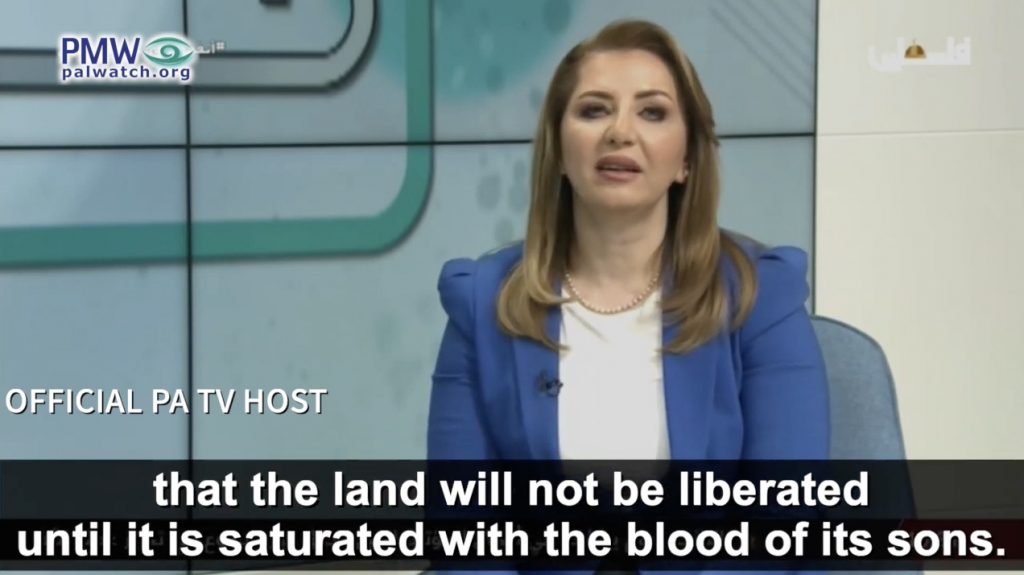Australia/Israel Review
Scribblings: A “blood and soil” Mother’s Day
May 3, 2022 | Tzvi Fleischer

Here’s a lovely thought for Mother’s Day:
The most sacred mothers are the Martyrs’ mothers. They are the most beautiful mothers because they taught their children that victory is not achieved through words and slogans but through strong red blood… they taught their children that the land will not be liberated until it is saturated with the blood of its sons.
Whoops! That’s not a thought for Australian Mother’s Day, May 8, but Palestinian Mother’s Day, March 21. And the above words were part of the greeting given to Palestinian mothers by the host on official PA-TV, owned and operated by the “moderate” Palestinian Authority (PA).
What is notable about that greeting is not simply the veneration of martyrdom as the highest good, but the language employed to do so – language about “strong red blood”, and how the “land” can only be liberated by being “saturated with the blood of its sons.”
Idealising the shedding of sacred blood as the key to liberation of the land is hardly unique to the PA’s Mother’s Day statement. It is widespread in Palestinian discourse. For instance, PA head Mahmoud Abbas himself spoke in Sept. 2015 about welcoming “every drop of blood spilled in Jerusalem. This is pure blood, clean blood, blood on its way to Allah…”
Rhetoric from Abbas’ Fatah party routinely describes “martyrs” killed while attacking Israelis as having “watered” the ground with their “pure blood”. For instance, during the so-called “knife intifada” in 2015, on social media Fatah described one stabber killed as having “watered the soil of Palestine with his pure blood,” another as having “watered the ground of Hebron with her pure blood,” and said of still another, “his blood was not spilled in vain, after he saturated his first love – Palestine – with it.” (All above quotes supplied by Palestinian Media Watch).
What is striking about such poetic rhetoric about sanctified “blood” soaking the land is that it bears some striking parallels with the ugliest form of European nationalism, so-called “blood and soil” nationalism. Developed mainly in Germany during the 19th century – though echoed by many other national groups – as part of the romantic movement there, it ultimately became a key part of Nazi ideology, under the slogan “Blut und Boden”. It was used as justification both for the German people’s need for Lebensraum (Living space) conquered at the expense of supposedly inferior Slavs to the east, and for the exclusion and ultimately murder of non-“Aryans” to protect the supposed purity of the “blood” of the Aryan German Volk.
“Blood and Soil” is a chant still frequently heard at neo-Nazi rallies around the world today.
To be fair, there are some differences between the Palestinian rhetoric and 19th and 20th century European “blood and soil” nationalism – the “blood” in the original German concept was explicitly racial, and the soil element included a focus on idolising rural peasants over “cosmopolitan” city dwellers, neither of which is central to the Palestinian rhetoric. But the romantic, poetic invocation of blood and soil in such rhetoric still encourages a form of nationalism with little emphasis on state-building, or national self-expression and cultural development, and a great deal on uncompromising violence, war and death.
The Palestinians had a weak national identity in the early part of the 20th century, but it is clear that the form of Palestinian nationalism that has developed since then under the influence of leaders like Haj Amin Al-Husseini and Yasser Arafat – together with outside sponsors such as Egyptian President Gamal Nasser, Syrian President Hafez al-Assad and Iraq’s Saddam Hussein – is one with which it is very difficult to coexist. It contains a large admixture of the worst sorts of nationalism – such as “blood and soil”. Even the supposedly “moderate” PA continues to tirelessly promote this extreme version of nationalism to new generations, even on occasions such as Mother’s Day.
Given this, is it any wonder there is no Israeli-Palestinian peace?
Incitement Independently Validated
This column has repeatedly tried to call attention to the problem of widespread incitement to violence and hatred, and incentivisation of terrorism, by official Palestinian bodies, as in the above item on Palestinian Mother’s Day. But perhaps you are sceptical, and think things are not as bad as AIJAC says?
Well, here are two stories in which independent outside observers have agreed that such official PA incitement and incentivisation of terror are indeed very serious problems:
• On March 31, the European Parliament’s Budgetary Control Committee passed a resolution condemning the PA for failing to remove incitement from EU-funded textbooks as the EU had previously demanded. The resolution said the Committee “Deplores that problematic and hateful material in Palestinian school textbooks has still not been removed and is concerned about the continued failure to act effectively against hate speech and violence in school textbooks…” A study done by the NGO Impact-SE found much material in the latest PA curriculum that lionises anti-Israel terrorism and was openly antisemitic.
• Meanwhile, on April 10, Israel’s Supreme Court ruled that the PA can be sued by victims of terrorism as a result of the PA’s “pay for slay” policy of rewarding terrorists and their families. Under this policy, the PA pays substantial stipends to Palestinian security prisoners in Israeli jails and to families of those killed while committing terror attacks. While the PA has claimed that these are social welfare payments for needy people, Palestinian families in need whose members have not been involved in violence against Israel get much smaller payments. The Israeli High Court, which all knowledgeable observers agree is one of the most independent, effective and legally impressive in the world, found in its judgment that, through “pay for slay”, the PA “expresses consent to [Palestinian terrorists’] actions, in a way that takes responsibility for those acts.”
Tags: Israel, Palestinian Authority, Palestinians






